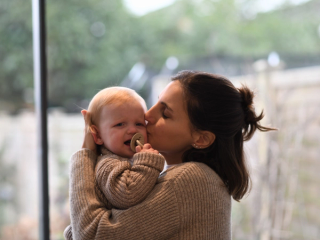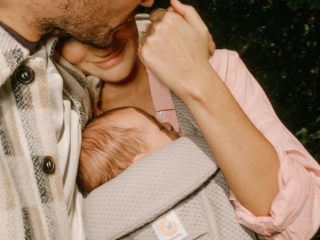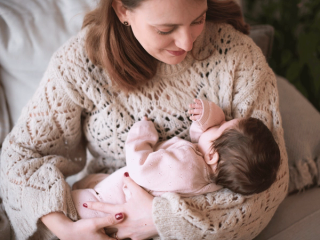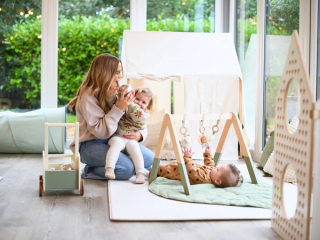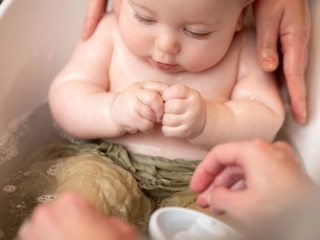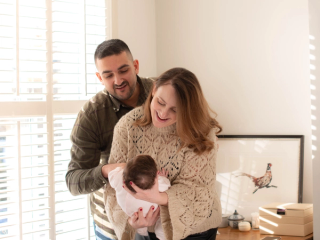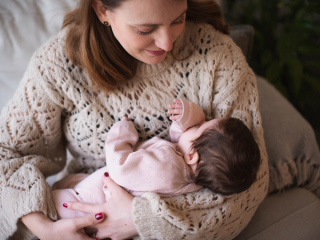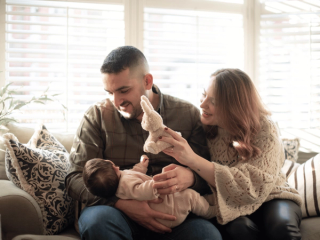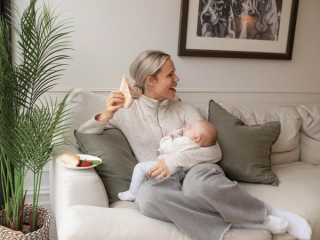
- Home
- Advice Hub
- Newborn
- New Parent Support
- Looking After Your Mental Health
Looking after your mental health
Here is a quick guide on how to look after your mental health, recognise common symptoms and how to get the right help and support.
The information in this article is for education purposes and should not replace professional medical advice. Always consult medical professionals/your healthcare provider for diagnosis and treatment.
Becoming a new parent is an incredible journey which can bring with it a whirlwind of emotions. You feel joy and excitement, ready to take on this new challenge, yet at the same time you may feel apprehensive, unsure what to expect and how to navigate this new journey and all the changes it brings. To help you with this transition into parenthood it is important to prioritise your mental health and well-being. Here is a quick guide on how to look after your mental health, recognise common symptoms and how to get the right help and support.
Tips for looking after your mental health and well-being
Ask for help
As a new parent, it's easy to feel overwhelmed by the demands of caring for a newborn. It may seem obvious, but there are so many loved ones, friends, communities, groups, charities and healthcare professionals ready to help - they just need you to tell them! Accepting help with household chores, meal preparation, or just someone to watch the baby whilst you have a shower or nap can alleviate stress and allow you some time to rest and recharge.
Communicate with your partner
Open and honest communication with your partner is crucial for navigating the challenges of parenthood together. Share your feelings, fears, and responsibilities and support each other through the highs and lows of this journey. By working as a team, you can overcome obstacles more effectively and strengthen your bond with your new arrival and each other.
Build your support network
By surrounding yourself with a supportive network of family, friends, and fellow parents who understand the challenges you're facing, you can build a robust support network. Connecting with others who share similar experiences can provide comfort, reassurance, and practical advice. You can meet new parents through antenatal classes, local parent-and-baby groups, support groups either locally or via social media - ask your health visitor for more information. Remember many are going through similar experiences to you - you’re not alone on this journey.
Prioritise self-care
This might seem easier said than done, but as a mother, I can testify that amidst the demands of caring for a newborn, it's essential to prioritise your own well-being. With time often scarce, don’t over complicate it! Make time for simple activities that nourish your body and soul, whether it's enjoying a hot bath, practising a few minutes of mindfulness, or going for a short walk in nature.
Look after your physical health
It’s important to look after your physical health needs as it can have an impact on your mental well-being. Ideally you want to be eating and drinking well, exercising and sleeping well. So how exactly can you do these things with a newborn I hear you ask! Again keep it simple, try batch cooking and freezing some nutritious meals. Carry a water bottle with you so you stay hydrated and try to stay active even if it’s a few minutes each day.
Lack of sleep in particular can have a significant impact on your mental health so aim to nap when the baby naps or ask your partner or a family member to watch the baby whilst you nap. Above all, it’s important to listen to your body's cues for rest and relaxation.
Keep a simple routine
Parenthood is incredible but can be unpredictable - establishing a simple routine will help to provide structure and stability to navigate this period. Write down and prioritise essential tasks, remember you won’t be able to do everything and that’s ok! Be realistic and learn to let some things go.
Be kind to yourself
As a new parent, it's natural to experience moments of doubt and apprehension. Be gentle with yourself and acknowledge the strength and resilience it takes to navigate this journey. Remember and celebrate how far you’ve come, and practice self-compassion during this amazing yet challenging period of your life.
What symptoms to look out for
While fluctuations in mood are common during pregnancy and after childbirth, persistent feelings of sadness, anxiety, or hopelessness may indicate a more significant mental health concern. Look out for signs like changes in appetite or sleep patterns, difficulty bonding with your baby, persistent negative thoughts or thoughts of self-harm. If you experience any concerning symptoms, it’s important to seek professional support.
What support is available
Remember: prioritising your mental health is crucial and seeking support is a sign of strength, not weakness. You deserve compassionate care and support as you navigate the journey of parenthood.
Where to seek help
If you're struggling with your mental health during pregnancy or after birth, don't hesitate to seek help:
- Speak to a healthcare professional such as your midwife, health visitor, or GP they can provide support and treatments tailored to your needs. They can also refer you to a mental health specialist if needed.
- In emergencies, such as suicidal thoughts or immediate danger, call 999 or attend A&E. If you need urgent support you can contact NHS 111, your local NHS mental health helpline or Samaritans they provide confidential support and are available 24/7 to listen to you.
- Speak to your partner, a trusted friend or family member about how you feel.
- Explore resources and support through organisations like the Maternal Mental Health Alliance, PANDAS Foundation and Mind which offer information and guidance for navigating perinatal mental health challenges.
- Association for Post-Natal Illness (APNI) offers friendly advice and support for individuals experiencing postnatal depression.
- Tommy's offers support for individuals who have experienced baby loss or had difficult or traumatic pregnancies, births, or postnatal periods.
- Home-Start UK can pair you with a volunteer who can visit you to offer practical and emotional support.
Parenthood is a beautiful journey full of joys and challenges! By prioritising your mental health, seeking support when needed, and practising self-care, you can navigate the complexities of this period of your life whilst enjoying time with your newborn. Remember, you are not alone - there are resources and people available to support you every step of the way. Embrace the journey, cherish the moments, and trust in your ability to overcome any obstacle that comes your way.
Advice & tips

Want to read more? Join the HiPP BabyClub for full access to this article.
As a BabyClub member, you'll get access to a range of exclusive benefits, including:
Monthly competitions
Discounts from our Partners
Expert advice tailored to your little one's age
Weaning recipes
HiPP shop discounts*
*10% off HiPP's online shop does not apply to our First Infant, Anti-Reflux or Comfort Formula Milk.
Important notice: Breastfeeding is best. Follow on milk should only be used as part of a mixed diet from 6 months. Talk to a healthcare professional.





